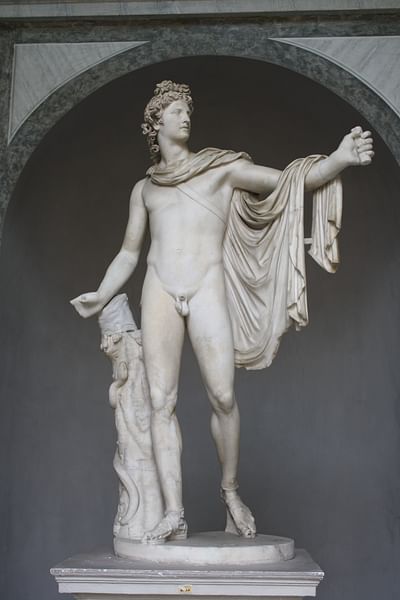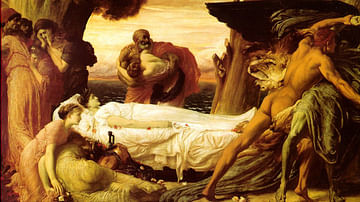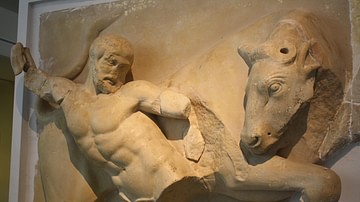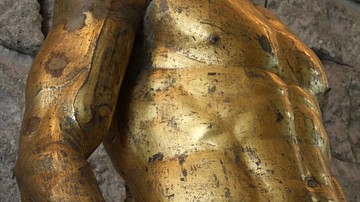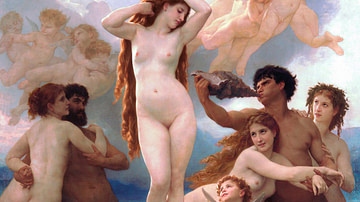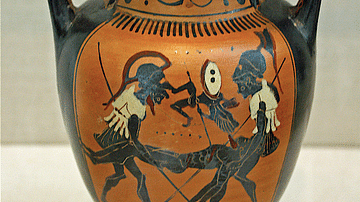For the ancient Greeks, the quality of arete (personal excellence) and the concept of eusebia (social duty) were most important. Aristotle discusses both of these at length in his Nichomachean Ethics and relates arete to eudaimonia - translated as "happiness" but actually meaning "to be possessed of a good spirit". To have arete, Aristotle claims, one must associate oneself with those striving for the same goal. If one wanted to become an excellent musician, one should associate oneself with excellent musicians and the same if one wished to be a star athlete or carpenter or doctor. The Greek concept of eusebia is often translated into English as "piety" (as, for example, in Plato's dialogue of the Euthyphro), but the concept is actually much closer to "duty", particularly social duty. Eusebia dictated how one interacted with one's husband, wife, parents, servants, and those of higher and lower classes. Eusebia also touched on how one understood the gods (though not on how one interacted with the gods, which would be the concept of housia, much closer to "piety"). The gods, and especially the all-powerful Fates, controlled and directed the lives of human beings and one needed to accept that fact and live one's life accordingly. If one suffered some tragic loss or financial set-back, it was the will of the gods, or the Fates whom not even the gods could sway, and by accepting this as the order of the universe, one could better accept such loss.
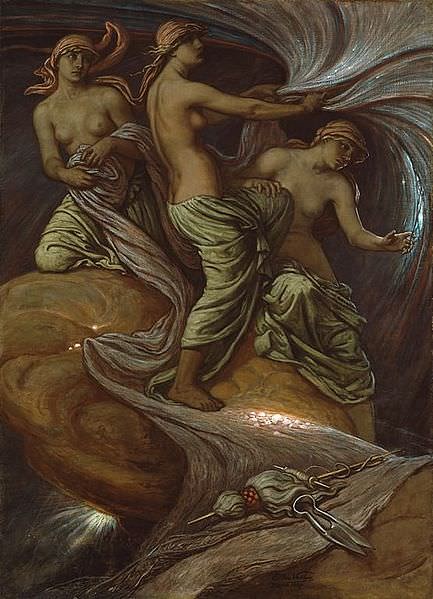
The stories the Greeks told - which today are referred to as their myths - played a part in understanding arete and eusebia in that they illustrated for the listeners these virtues of Greek civilization. In hearing how heroes and kings and even gods behaved, one was provided with a model for one's own behavior. Among the many myths the Greeks told, one that exemplifies the virtues of personal excellence and social duty is the story of Hercules and the Queen Alcestis. There are two versions of the myth, one in which Hercules plays no part at all, but thanks to the playwright Euripides (480-406 BCE), and his play Alcestis, the version featuring Hercules is the better known.
The Story of Alcestis & Admetus
Both versions begin the same way and emphasize the importance of loyalty, love, and kindness in informing one's social duty. Once upon a time, as the story goes, there lived a gentle king named Admetus who ruled over a small kingdom in Thessaly. He knew each of his subjects by name and so, one night when a stranger appeared at his door begging for food, he knew the man must be from a foreign land but welcomed him into his home anyway. He fed and clothed the stranger and asked him his name but the man would give no answer other than to ask Admetus if he could be the king's slave. Admetus had no need for another slave but, recognizing the man was in distress, took him on as shepherd for his flocks.
The stranger stayed with Admetus for a year and a day and then revealed himself as the god Apollo. He had been sent to earth by Zeus as punishment and could not return to the realm of the gods until he had served a mortal as a slave for a year. Apollo thanked Admetus for his kindness and offered him any gift he desired; but Admetus said he had all he needed and required nothing for what he had done. Apollo told him he would return to help him whenever he needed anything in the future and then vanished.
Not long after this, Admetus fell in love with the princess Alcestis of the neighboring city of Iolcus. Alcestis was kind and beautiful and had many suitors but only wanted to marry Admetus. Her father Pelias, however, refused Admetus' request for her hand and stipulated that the only way he would give his daughter to him would be if he rode into the city in a chariot pulled by a lion and a wild boar. Admetus was despondent over this situation until he remembered the promise of Apollo. He called on the god who appeared, wrestled a lion and a boar into submission, and yoked them to a golden chariot. Admetus then drove the chariot to Iolcus and Pelias had no choice but to give him Alcestis in marriage. Apollo was among the wedding guests and gave Admetus an unusual gift: a kind of immortality. Apollo told them how he made a deal with the Fates who governed all so that, if ever Admetus became sick to the point of death, he might be well again if someone else would volunteer to die in his place.
The couple lived happily together for many years and their court was famous for their lavish parties but then, one day, Admetus fell ill and the doctors said he would not recover. The people of his court remembered the gift of Apollo and each felt that someone should give their life to save so kind and good a king; but no one wanted to do so themselves. Admetus' parents were old and so it was thought that one of them would volunteer but, even though they had only a short time left on the earth, they refused to surrender it. None of the court, nor any of Admetus' family, nor any of his subjects would take the king's place on his death bed - but Alcestis did.
At this point the two stories diverge. In the older version, Admetus wakes on his bed feeling better and runs to tell Alcestis he is cured - only to find it was she who took his place. He then sits by her body in mourning and refuses to eat or drink for days. As this is going on, Alcestis' spirit is led down into the underworld by Thanatos (death) and presented to Queen Persephone. Persephone asks who this soul is who has come willingly to her realm and Thanatos explains to her the situation. Persephone is so moved by the story of Alcestis' love and devotion to her husband that she orders Thanatos to return the queen to life. Alcestis and Admetus then live happily ever after.
Hercules & Alcestis
In the version popularized by Euripides in his play Alcestis (written c. 438 BCE), however, Hercules plays the pivotal role in bringing Alcestis back from the dead. In this version, as in the first, no one will take Admetus' place in death except for Alcestis. Admetus is informed of this, accepts her sacrifice, and begins to recover as his queen grows weaker. The entire city falls into mourning for Alcestis as she hovers on the brink between life and death. Admetus stays by her bedside and she requests that, in return for her sacrifice, he should never marry again and so keep her memory alive. Admetus agrees to this and also swears he will never throw another of their parties again nor allow any merrymaking in the palace once she has gone; after these promises are made, Alcestis dies.
Hercules was an old friend of the couple and he arrives at the court knowing nothing of Alcestis' death. Admetus, not wishing to spoil his friend's arrival, instructs the servants to say nothing about what has transpired and to treat Hercules to the kind of party the court was known for. The servants, however, are still upset over the loss of the queen and Hercules notices that they are not serving him and his entourage properly. After a number of drinks, he begins to insult them and ask for the king and queen to come remedy this poor performance on the servant's part, when one of the maidservants breaks down and tells him what has recently happened.
Hercules is mortified by his behavior and so travels to the underworld where Thanatos is leading Alcestis' spirit toward Persephone's realm. He wrestles death and frees the queen, bringing her back up into the light of day. Hercules then leads her to where Admetus is just returning from her funeral. He tells the king that he must depart on other business and asks him to take care of this lady while he is gone. Admetus refuses because he promised Alcestis that he would never marry again, and it would be unseemly for this woman to reside at the court so soon after his wife's death. Hercules insists, however, and places Alcestis' hand in Admetus'. Admetus lifts the woman's veil and finds it is Alcestis returned from the dead. Hercules tells him that she will not be able to speak for three days, and will remain pale and shadow-like, until she is purified, after which time she will become as she always was. Euripides' play ends there while other versions of the myth continue the story further and conclude with everything then happening as Hercules has said, and Alcestis and Admetus living a long and happy life together until Thanatos returns and takes them both away together.
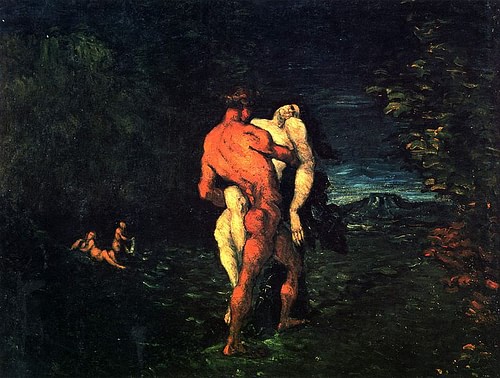
Personal Excellence & Social Duty in the Tales
The characters of Admetus, Alcestis, and Hercules, all at some point in the story exemplify - or fail to meet - the values of personal excellence and social duty. Admetus exemplifies the value of hospitality (which would be considered part of social duty) in taking in the stranger at the beginning of the story and would fall short of that value when he allows festivities in his home directly after his wife's death. These two incidents are directly related to each other, however, in that, when Hercules arrives at his home, Admetus is under a social obligation to entertain his friend according to the custom he is used to. Even though Hercules would have certainly understood the house being in mourning after Alcestis' death and is embarrassed when he finds out he has been drinking and carrying on in the palace so soon after a death, Admetus values social obligation to such a degree that he fails to keep his promise to his wife - and so fails in arete and, because he neglected the promise he had made to Alcestis, eusebia as well.
Alcestis epitomizes the loyal, loving wife who is so devoted to her husband that she would literally die for him. In this, she exemplifies both arete and eusebia. A modern-day reader may feel uncomfortable with the version of the story in which Admetus accepts his wife's sacrifice, but this would have been completely understandable to an ancient Greek audience. The husband, especially the husband who was a king, was responsible for the well-being of more people than the wife or queen. Alcestis' virtue in taking Admetus' place is admirable in that she not only sacrifices herself for the man she loves but also for the people who depended upon Admetus for their continued well-being. Her personal excellence is illustrated in her willingness to die for the good of others and the value of eusebia through her understanding of the social order and how she could do her best to maintain it. In all ways, Alcestis stands as a model for proper behavior.
Hercules exemplifies the values of arete and eusebia and provides the story with its heroic climax. In his drunken behavior in the house of mourning, he fails in both, of course, and yet he cannot be blamed for this in that he was not told of Alcestis' death. The more important - and interesting - breach in social conduct is his wrestling Thanatos for Alcestis' soul. The Fates were all powerful to the ancient Greeks, and Apollo had made a deal with them for Admetus' continued life. The Fates had kept their part of the deal and restored Admetus to life, once someone else agreed to take his place. By wrestling Alcestis' soul away from death, Hercules was breaking the deal. If one made a deal with the supernatural powers, one was expected to honor that deal. This can be most clearly seen in the story of Orpheus and Eurydice, where Orpheus makes the deal with Hades that he will not look back on his way up from the underworld but then breaks that deal, and so loses Eurydice. Unlike that story, at no point in any version of the Alcestis story is Hercules portrayed in any way but admirably for rescuing the queen from death. Further, by placing himself in danger by physically wrestling death, Hercules embodies the personal excellence of courage and heroism and, by doing so, he restores order to the kingdom by bringing the queen back to her king and rewarding the selflessness of Alcestis.
The story operates on many levels, of course, which is why it has resonated so strongly with audiences for over 2,000 years but, on the simplest level, it would have transmitted the values of the society to those who heard it sung or recited or watched it performed. How one balances one's personal excellence with one's place in society and, further, in the universe, would have been illustrated through Hercules and his confrontation with Thanatos. In defeating death, Hercules is shown as the ultimate hero who defies even the will of the Fates in order to do what he feels is right.
In the version of the story where Persephone sends Alcestis back to life, it is eusebia which is emphasized through Alcestis' selfless gesture while, in the Hercules' version, it is arete through Hercules' decision to fight with death, and yet both versions highlight the importance of both of these values to ancient Greek society. The popularity of the Hercules' version indicates that, while the ancient audience would have understood the value of social duty and conduct, they also valued personal achievement and, of course, heroism, which is the embodiment of personal excellence. Scholars have long been divided on the Alcestis play by Euripides regarding why he wrote it and even what he was trying to say in it but, perhaps, it was as simple as promoting the concept that one should do what one feels one must to right a wrong no matter what societal rules may stand in the way and, in doing so, one can actually restore order instead of upsetting balance.
